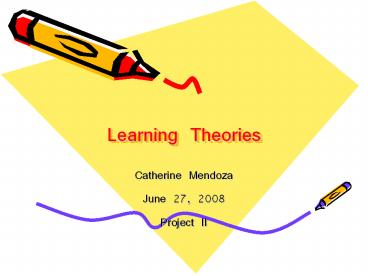Learning Theories PowerPoint PPT Presentation
Title: Learning Theories
1
Learning Theories
- Catherine Mendoza
- June 27, 2008
- Project II
2
Cognitive Theories
- Learning is a process of relating new information
to previously learned. - Knowledge is organized.
- Individuals are actively involved in
- the learning process
3
Behaviorist Theories
- Organisms are born as blank slates.
- Learning is learning is largely the result of
environment events. - The most useful theories tend to be parsimonious
ones
4
Vygotsky and his Social Cognition
- Two sorts of childs intellectual are
- First, children acquire the content of their
thinking, that is, their knowledge. - Second, the process if their thinking is the
tools of intellectual adaptation.
5
B.F. Skinner and his Behaviorism
- Two different types of conditioning.
- Classic conditioning When a natural reflex
responds to a stimulus ( animal and people are
wired). - Operant conditioning When a response to a
stimulus is reinforced. - Skinner used techniques to teach pigeons to dance
and bowl a ball.
6
B.F. Skinnerways of teaching
- Behaviorism is often used by teachers, who reward
or punish student behavior. - The learner should be able to put together his
own response rather than select from
alternatives. - The success of such a machine depends on the
material used in it.
7
Vygotsky Impacts Learning
- Curriculum Children learn through interaction
between learner and learning. - Instruction Children can perform tasks that they
are incapable of completing on their own. - Assessment Children can do on their own is their
level of development.
8
Educational Behaviorist
- Behavior changes can confirm that learning has
taken place. - Student learn when they actually have a chance to
behave. - Rewards or reinforcement for learning
9
Educational Cognitive
- Cognitive processes influence learning.
- Children organize the things they learn.
- People control their own learning.
10
Web Sites
- html file//P\EHS\Cognitive Learning Theory
- http//suedstudent.syr.edu/ebarrett/ide621/behavi
or.htm - http//www.funderstanding.com/vygotsky.cfm
- http//www.funderstanding.com/behaviorism.cfm
PowerShow.com is a leading presentation sharing website. It has millions of presentations already uploaded and available with 1,000s more being uploaded by its users every day. Whatever your area of interest, here you’ll be able to find and view presentations you’ll love and possibly download. And, best of all, it is completely free and easy to use.
You might even have a presentation you’d like to share with others. If so, just upload it to PowerShow.com. We’ll convert it to an HTML5 slideshow that includes all the media types you’ve already added: audio, video, music, pictures, animations and transition effects. Then you can share it with your target audience as well as PowerShow.com’s millions of monthly visitors. And, again, it’s all free.
About the Developers
PowerShow.com is brought to you by CrystalGraphics, the award-winning developer and market-leading publisher of rich-media enhancement products for presentations. Our product offerings include millions of PowerPoint templates, diagrams, animated 3D characters and more.

